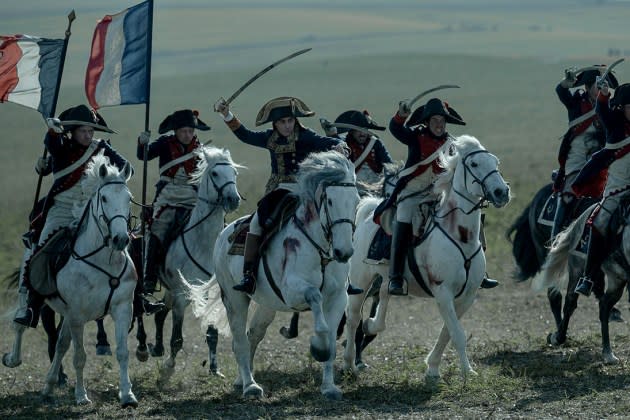Ridley Scott’s ‘Napoleon’: What the Critics Are Saying

Ridley Scott’s epic Napoleon hits theaters Nov. 22, but the review embargo for the film broke Tuesday night, and the early reaction from critics has been largely positive.
Written by David Scarpa, the lavish period film, which clocks in at a meaty two hours and 38 minutes, stars Oscar winner Joaquin Phoenix as the French military commander and later despot Napoleon Bonaparte, with Vanessa Kirby as his consort, Empress Joséphine. The movie charts Bonaparte’s meteoric rise from lowly artillery commander to Napoleon I, emperor of France, and takes in notable military engagements such as the battles of Austerlitz and Waterloo.
More from The Hollywood Reporter
Among the early reviews, Napoleon has been praised for its epic scale, particularly the set-piece battle scenes that make the film a worthy theatrical experience. Critics also praised Scott for his ambition in telling Bonaparte’s disparate story. There was praise, too, for Phoenix and Kirby’s performances. Some critics took issue with the film’s length and the feeling that maybe Scott’s direction was a touch bloated.
As of Tuesday evening, Napoleon‘s Rotten Tomatoes score clocked in at 78 percent from 27 reviews, and 70 percent on Metacritic from 19 reviews.
Napoleon is from Apple Original Films and Sony Pictures. The film will be released in theaters Nov. 22 by Sony Pictures and will stream on Apple TV+ at a later date.
Below are key excerpts from some of the most prominent early reviews.
In a mixed review, The Hollywood Reporter’s David Rooney wrote that Napoleon, “for all its brawn and atmosphere and robustly choreographed combat, this is a distended historical tapestry too sprawling to remain compelling, particularly when its focus veers away from the central couple.” Rooney added that “while Scott can be commended for his ambition, neither he nor Scarpa manage to build those many plot pieces into a fluid narrative.”
In his five-star rave review in The Guardian, Peter Bradshaw wrote that the film is “a deliciously insinuating portrayal of the doomed emperor from Joaquin Phoenix, whose derisive face suits the framing of a bicorne hat and jaunty tricolour cockade.” Bradshaw praised the scope of the film and Scott leaning into spectacle, writing that the director “doesn’t detain the audience with metaphysical meaning and certainly doesn’t withhold the old-fashioned pleasures of spectacle and excitement.”
IndieWire’s David Ehrlich was mostly satisfied with the film and found that Napoleon worked better as a comedy than a historical epic, given the series of laugh-out-loud moments in the film. “A stinging character study entombed within a sweeping epic that starts like a house on fire before stumbling through the climactic years of its subject’s life with all the grace and purpose of the Austrian army trying to flee Austerlitz, Napoleon works best whenever it reads the French emperor for filth, which it does early and often.”
Catherine Bray, writing in Empire Magazine, also found Napoleon worthwhile and described the film as “a historical epic which is constantly on the lookout for subtle ways to undercut historical epics.” She continues, “Scott’s take on Napoleon is distinctively deadpan: a funny, idiosyncratic close-up of the man, rather than a broader, all-encompassing account.”
Less enthralled was critic Brian Tallerico, who writes in his review at RogerEbert.com that Napoleon is “a series of accomplished battle sequences looking for a better movie to connect them.” Tallerico is another who takes issue with the scope of the film, writing that “one of the problems is that David Scarpa’s script tries to pack a lot of life into the running time of a single film.”
Uproxx’s Mike Ryan is another critic who highlights the comedy aspect of the “surprisingly hilarious” Napoleon. “I cannot take credit for this observation, but a friend of mine who saw the movie said, ‘It’s like watching Tim Robinson play Napoleon,’ and this is pretty dead on. Oh, make no mistake, this is by design,” Ryan writes, adding, “This is not my way of saying Napoleon is bad. It’s honestly now one of my favorite movies of the year — a movie that, before I saw it, looked a little too stoic and ‘important.’ Instead, I probably laughed harder during this movie than I have during any new movie this year. And the laughs are genuine and intentional.”
BBC critic Nicholas Barber was captivated by the spectacular battle scenes and plenty of pithy vignettes and writes that Napoleon is “an awe-inspiring achievement, although it may leave you with a greater appreciation of Scott’s leadership skills than of Napoleon’s.” Barber writes that “the film serves as a terrific precis of Napoleon’s career, a beautifully illustrated Wikipedia page that ticks off most of the major events in his adult life.”
Writing for Total Film, Jordan Farley felt that Napoleon is one of Scott’s “finest features in almost two decades.” Farley writes that “the film can feel like it’s in a race to squeeze everything in, while the essential politicking that unfolds on the fringes and in back rooms is never as gripping as when Napoleon and Josephine’s deeply unhealthy relationship plays out.”
Best of The Hollywood Reporter